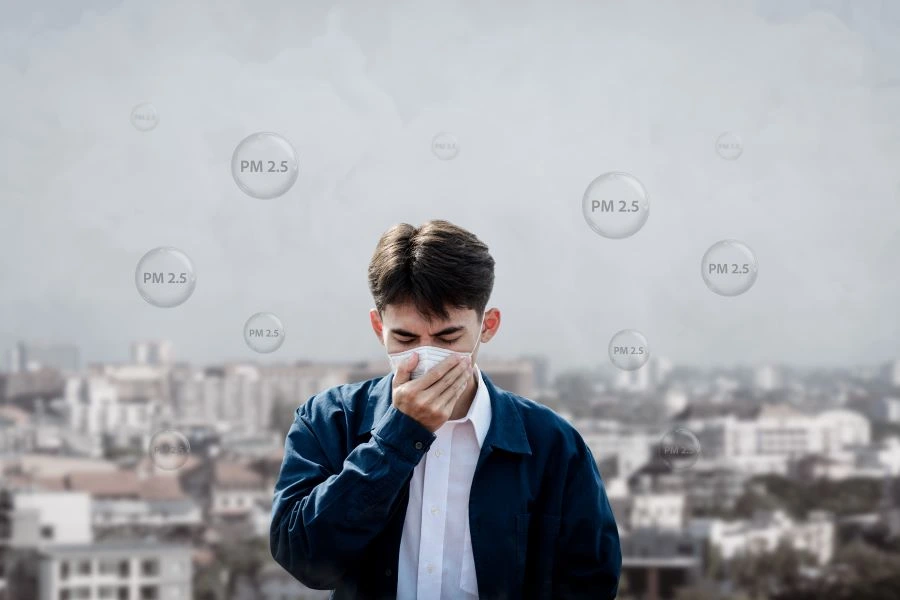Eating fruits may improve lung function impacted by pollution
Key takeaways
- Eating four or more portions of fruit daily may reduce the harmful impact of air pollution on lung function.
- The protective effect is likely linked to fruits’ antioxidant and anti-inflammatory compounds.
- Experts stress that healthy diets help, but governments must remain accountable for reducing air pollution.

A new observational study suggests that consuming fruits may reduce the harmful effects of air pollution on lung function. Women who consumed four or more portions of fruit daily showed less decline in lung function than those who consumed less. Researchers suggest that fruit antioxidant and anti-inflammatory properties may play a role in this protective effect.
This finding does not mean consumers should be held accountable for their lung health, advises a professor not involved in the study, who urges that governments should continue targeting pollution reduction.
“Over 90% of the global population is exposed to air pollution levels that exceed WHO guidelines, and ample research shows that exposure to higher air pollution levels is associated with reduced lung function,” explains study lead Pimpika Kaewsri, Ph.D. student from the Centre for Environmental Health and Sustainability at the University of Leicester, UK.

“Separately, a healthy diet — particularly one high in fruits and vegetables — has been linked to better lung function. We wanted to explore whether a healthy diet or specific food groups could modify or partly mitigate the known adverse effects of air pollution on lung function.”
Kaewsri presented her research at the ongoing European Respiratory Society Congress in Amsterdam, the Netherlands (September 7 to October 1).
Healthy diet for better lungs
The study examined data from the UK Biobank of 200,000 participants, comparing their dietary patterns with their lung function. Kaewsri also accounted for age, height, and socioeconomic status.
 The protective effect is likely linked to fruits’ antioxidant and anti-inflammatory compounds.This included examining fruit, vegetables, and whole grains and measuring people’s exposure to air pollution in the form of fine particulate matter (PM2.5), a very small concentration that vehicle exhausts and industrial processes release into the air.
The protective effect is likely linked to fruits’ antioxidant and anti-inflammatory compounds.This included examining fruit, vegetables, and whole grains and measuring people’s exposure to air pollution in the form of fine particulate matter (PM2.5), a very small concentration that vehicle exhausts and industrial processes release into the air.
Kaewsri’s team saw that for every increase in exposure to PM2.5 of five micrograms per cubic metre of air, there was a 78.1 ml reduction in FEV1 — the amount of air exhaled in one second — in the low fruit intake groups. This was only a 57.5 ml reduction in the high fruit intake group in women.
“Our study confirmed that a healthy diet is linked to better lung function in both men and women, regardless of air pollution exposure. Women who consumed four portions of fruit per day or more appeared to have smaller reductions in lung function associated with air pollution compared to those who consumed less fruit.”
“This may be partly explained by the antioxidant and anti-inflammation compounds naturally present in fruit. These compounds could help mitigate oxidative stress and inflammation caused by fine particles, potentially offsetting some of the harmful effects of air pollution on lung function,” explains Kaewsri.
Men in the study population generally ate lower amounts of fruit than women, which may explain the protective benefits seen in women. In the future, Kaewsri plans to explore whether diets can influence lung function over time.
Anti-pollution policies needed
Kaewsri’s study evidences the potential respiratory health benefits of a healthy, fresh fruit diet, affirms Professor Sara De Matteis, Chair of the European Respiratory Society’s expert group on occupational and environmental health, at the University of Turin, Italy, who was not involved in the research.
“However, access to a healthy diet is not equally distributed in the population and, even if the authors adjusted for socio-economic status, some residual confounding cannot be ruled out. A healthy plant-rich diet should be promoted in the population starting from primary school, not only for preventing chronic diseases, but also to reduce the carbon footprint of meat-rich diets.”
“This does not exempt governments from continuing with environmental policies to reduce air pollution to as low as possible, given there are no safe exposure levels, and it does not transfer their accountability to individuals whose diet choices are often constrained by economic needs,” she warns.
Matteis cautions that governments should not be exempt from enforcing environmental polices to reduce pollution to as low as possible, while underscoring that there are no safe exposure levels. “It does not transfer their accountability to individuals whose diet choices are often constrained by economic needs.”













